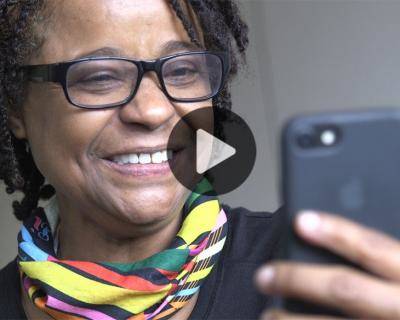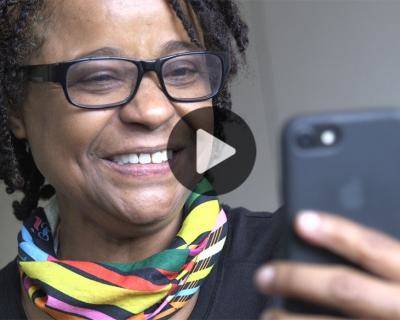
Credit: Shawn Rocco/Duke Health
DURHAM, N.C. – Heart patients who participate in cardiac rehab programs typically do well during enrollment but tend to revert to unhealthy lifestyles once the formal gym-based regimens end.
Finding a way to sustain patients' lifestyle improvements after supervised cardiac rehab has ended was the focus of a small pilot study led by Duke Health researchers. They devised a follow-up program that uses wearable fitness trackers and call-in sessions with a health coach.
The 12-week mobile health, or mHealth, program not only kept cardiac rehab patients from losing ground, it appeared to help them maintain and even gain fitness. The researchers have published their findings in the American Heart Journal and are now looking to scale up the study with a larger group of patients.
"The benefits of a cardiac rehab program are well-established, but the gains tend to be temporary," said senior author William Kraus, M.D., who led the project as part of the Duke Molecular Physiology Institute. "Good habits are hard to maintain for a lot of people once they are on their own and no longer have someone overseeing their progress."
Kraus and exercise physiologist Brian Duscha used modern devices to build a post-rehab regimen that could provide a measure of oversight and motivation outside of a gym-based regimen.
The researchers enrolled 25 heart disease patients after they completed a typical cardiac rehabilitation program, which included 36 medically guided exercise sessions in a gym setting, diet counseling and other programs that encourage healthy lifestyle choices.
Following rehab, 16 of the patients were randomly selected to participate in the mHealth intervention, consisting of a wearable activity tracker, a personalized prescription to walk a certain number of steps a day, and up to 12 weeks of personalized virtual sessions with a health coach over the phone or computer.
A comparison group of nine patients were discharged from cardiac rehab with usual care, which did not include any specific lifestyle recommendations other than advice to continue with good diet and exercise choices.
After 12 weeks, the researchers measured fitness levels and physical activity levels of participants in both groups. As expected, the usual care group's peak fitness fell by a statistically significant 8.5 percent. But the mHealth group not only sustained their fitness levels, but actually continued to increase peak fitness, although not at a statistically significant rate given the small size of the study.
While the minutes per week of physical activity of people in the usual care group tailed off across all levels of activity, those in the mHealth group shifted their activity level to a higher intensity from moderate-low to moderate-high intensity.
"While both groups were exercising above the government guidelines of 150 minutes per week of moderate intensity at the end of cardiac rehab, only the mHealth group members were meeting this guideline 12 weeks after cardiac rehab," Duscha said.
"The mHealth group only decreased their moderate level exercise by 16 minutes per week, while the usual care group fell off by 113 minutes per week," he said. "This has important public health implications, because maintenance of physical activity and physical fitness are inversely associated with cardiovascular events, such as heart attack and stroke."
###
In addition to Kraus and Duscha, study authors include Lucy W. Piner, Mahesh P. Patel, Karen P. Craig, Morgan Brady, Robert W. McGarrah and Connie Chen.
The study received funding from Vida Health Inc.
Video: https://www.youtube.com/watch?v=2WnYfOvasig&feature=youtu.be
Media Contact
Sarah Avery
[email protected]
919-724-5343
@DukeHealth
http://dukehealthnews.org





